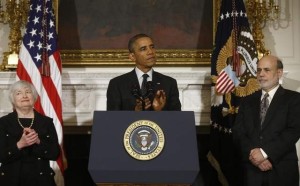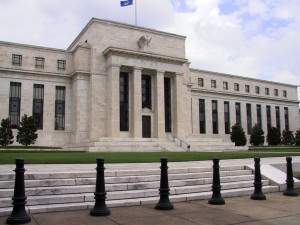Yellen Nominated for Federal Chairwoman
The recent nomination of Janet Yellen to arguably the most important and powerful job in the world economy has been seen as a ground-breaking move.
Becoming the first female ever to be nominated for the position of The Federal Reserve Chairman Yellen is on the verge of making history. With only 6 votes needed from the Republican side of the Senate it is extremely likely that she will take over from Ben Bernanke this January.
Bernanke who will retire at the end of the year has presided over the Fed since 2006. In his seven years as chairman he has endured some of the most difficult economic times in modern history including tackling the challenge of rescuing the American economy post financial crisis.
When Bernanke departs he is likely to receive a cascade of tributes; to many he bravely led the U.S economy through the crisis and initiated communication policies that have made the Fed more transparent to financial markets. Back in 2007 he acted promptly and displayed an aggressive and stimulative monetary policy style; lowering short-term interest rates to near zero and also launching unprecedented purchases of Treasury bonds and mortgage-backed securities to push down long-term interest rates. Under his leadership the Fed rolled out innovative products aimed at providing cash for banks to lend to consumers and businesses too.
However, as with any economic policy decisions, his strategy came under criticism at times, namely by outspoken Republicans. They castigated Bernanke for failing to spot the housing bubble and for implementing policies that, in their opinion, are ‘sowing the seeds for eventual high inflation’.
Yet it is likely that the shy and unassuming 56 year old’s legacy will remain with the Fed for the foreseeable future. The tenets of his ‘dovsish monetary policy’ and the Fed’s duel-mandate – pursuing stable employment and growth rates over inflation targets – will remain fundamental elements in any forthcoming policy decisions.
When nominating Yellen, President Obama complemented Bernanke’s tenure, saying “when faced with potential global economic meltdown, he has displayed tremendous courage and creativity.”
He added that he held Yellen in ‘the highest regard’ and believed she was ‘one of the nation’s foremost economists and policy makers’
So who is the lady taking the reigns of control at the central bank?
Whilst Janet Yellen may be a new name amongst the public domain, in economic circles she is a highly respected and renowned woman. The 67 year old has a long and distinguished career including teaching roles at Harvard and LSE, scholarly articles on unemployment, a board governor role for the Clinton registration and 11 years as the Fed’s vice-chair man. Indeed, on paper, she is one of the best-qualified candidates to ever by nominated.
She also has a close link to Warwick University; her son Robert, is an assistant professor here at the University and her husband, the esteemed economist, George Akerlof, spoke at the University’s 2012 Economic Summit.
Her economic beliefs are frequently described as ‘Keynesian’ and she is deemed one of the most ‘dovish’ member of the FOMC. As a result she has always allied herself with Bernanke and persistently defended his moves. She is also a ‘devoted advocate’ of transparent communications and firmly believes that the Fed should give explicit forward guidance about holding rates ‘ lower for longer’.
Thus the similarities between Yellen and Bernanke allow many economic commentators to reason that the transition in January will be smooth and ‘seamless’. A chief business correspondent, Linda Yueh, said that ‘because the two already work so closely together there will not be much impact’.
So what does the future hold the Fed under Yellen?
In short, much continuity. Her main goal will be to carry on following the Fed’s duel-mandate – maximum employment and stable prices. In doing this she is predicted to lead a withdrawal from the $85 billion a month of quantitative easing (however a precise starting date for this tapering has yet to be announced). Her recent speeches have also indicated that she believes that interest rates should be held at zero for a longer period even if inflation rises above 2 %. However it is expected that once unemployment has fallen to a tolerable level she is most likely to allow interest rates to go back up.
In the longer term she is may also deem it important to be able to leave behind an institution that can deliver on both aspects of the mandate more successfully as well as leaving behind an economy in a much stronger position and a central bank with a much healthier looking balance sheet.
Bernanke is thought to have been the best man to lead the US out of the financial crisis especially with his background as a scholar of the Great depression. As he retires and is replace by a scholar of unemployment and policy making, it is hoped that Yellen will be the best woman to drag the US out of their lethargic recovery.



Comments